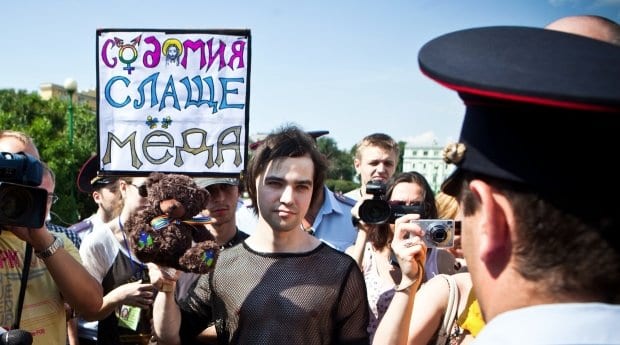Approximately 100 people gathered in St Petersburg, Russia, July 26 for the city’s fifth annual Pride. Unlike past years, when the event was interrupted by police arrests and fraught with violence from opposing groups, the afternoon passed smoothly, with only two participants detained by police.
“This year we did a lot of work to ensure safety,” says Yury Gavrikov, the lead organizer of Pride. Organizers made sure that police were on site and provided participants with safe transportation from the event in the form of armoured buses or a police escort to the subway. Police deployed 200 officers to monitor the event.
Gavrikov thinks the situation in Ukraine has made government cautious about encouraging rightwing extremist groups. “I think Ukraine acted as an example, and the current government is taking control of rightwing radical groups,” he says. “Many of the leaders of those groups [who incited violence in the past] are in jail or under house arrest.”
Gavrikov also attributes this year’s lack of violence to the event’s bloody history. In 2013, participants were attacked by rocks and bottles, and 12 people were injured when the windows of a bus leaving the scene were smashed. “Police get in trouble for failing to prevent violent crimes at these types of events,” he explains.
Although the event was peaceful, participants’ freedom was curtailed. Pride was confined to a fenced-in area of approximately 150 square metres on the Field of Mars, a location where all citizen groups have a constitutional right to freedom of assembly.
“We applied for permits to hold a procession, providing the city with several possible routes, but these requests were all denied,” says co-organizer Daniil Grachov. “Whatever route we suggested they would come up with an excuse as to why it could not be done.”
Instead, the event consisted of speeches by organizers, a ceremony where participants were invited to leave a handprint on a large, white banner with the event’s logo, and an open mic for attendees to share their thoughts and experiences.
According to Gavrikov, the city made an attempt to sabotage the peaceful situation. He says that while gathering on the Field of Mars is legal if authorities are given advance notice, the assembly is legal only as long as the event’s organizer is onsite. Gavrikov alleges that police attempted to lure him offsite by manufacturing a situation where the anti-propaganda law would be violated, arresting two participants, and then requesting that he accompany them to the police van.
“Our monitors who were onsite before the event saw a man come, say hello to the police, and leave two children seated just behind the fence,” Gavrikov explains. “We asked the police to remove the children to ensure we would not be breaking the law, but they did not take any action. I am sure that this was a provocation planned by the police.”
Evgeny Pirozhkov was arrested because his banner, which read “Sodomy is sweeter than honey” and was visible to the children, was identified as a violation of the anti-propaganda law, which forbids the dissemination of information about “non-traditional” sexual relations to minors.
Alexei Belozerov, a journalist whom Gavrikov had asked to videotape events around Pride, was arrested for filming children without their parents’ consent.
Both were taken to the police station for questioning. Belozerov was released. Pirozhkov was charged and ordered to appear in court next week. The LGBT Network will provide him with legal representation.
Most participants had positive experiences and said they were hopeful for improvement.
“I came to Pride because I think we need to come out and be open about who we are,” Andrei Yakolev says. “We will only be able to achieve equal rights and justice through living openly.”
Many were first-time attendees. “I decided to come out this year because I thought that we could really have a holiday,” Alex Semenov says. “I think that people’s attitudes have changed and also that the LGBT community has begun to feel strong enough to take part in these types of events. It is an important opportunity for me to demonstrate that I have the same rights as any other citizen of this country.”
Organizers were happy with the event and plan to continue organizing LGBT meetings in the city.
“We will keep coming out until we are heard,” Grachov says. “We demand that the Russian government remove discriminatory laws. We will achieve this because we are now united, and we are not afraid to come out onto the street and speak about our feelings and our needs.”

 Why you can trust Xtra
Why you can trust Xtra


